#literary roles
Note
What role in the manga is the undertaker meant to be? Is he an anti-hero, is he the end boss, is he the evil villain?
Undertaker's role?
Idk if I'd call him an anti-hero, simply because that's usually the role of a protagonist, like our earl and Sebastian.
I expect the (mostly emotional) end boss to be real Ciel, though he might be accompanied by Undertaker... at least at first. (This is a Mother3 parallel.)
Even Yana-san said at one point that Undertaker isn't a true villain. I expect the "evil" villain to be John Brown, or the queen under the influence/control of John Brown. (Another Mother3 parallel but even stronger as a Mother2 parallel.)
I think of Undertaker as a Severus Snape sort of character. Greatly flawed... but motivated by love to help take down the evil that destroyed the person he loved. Even if it means acting as a double agent... and as an adversary to someone he's sworn to protect. And he's both a foil and antagonist to Sebastian. (Some HP parallel tossed in for good measure.)
#black butler#kuroshitsuji#undertaker#literary roles#literary foil#adversary#double agent#antagonist#character analysis#minnesotamermaid71#asks#i answer#answered asks#hp#harry potter#mother3#mother2#jul 16 2023#i forgot what day it was
47 notes
·
View notes
Note
I ABSOLUTELY ADORE YOUR SQQ HE LOOKS SO FUCKINH DONE WITH LIFE

The recipe for SQQ is: calm on the outside, screaming on the inside.
#poorly drawn svsss#svsss#shen qingqiu#ask#No joke I'm pretty sure he is my favourite 'guy gets transporte'd to another world' character#I recently rewatched the (sadly never to be continued) animated version of SVSSS and I cant get over how perfect he is for the role#He is *so* done with everything going on around him. Forced to be calm and mean. Born to scream and be kind.#The gap between the internal and external dialogue is one of my fav character/writing quirks.#The personification of the 'he lied' dialogue tag.#Love how deep the SVSSS meta and literary analysis community gets with him. Piosplayhouse has opened my eyes to trans SQQ#what is the system is *not* a metaphor for pressure to adhere to societal norms of gender and sexuality?#I really need to finish the books...that is probably my biggest burning hole in my 'DNF' pile. I liked it! I just got busy.
1K notes
·
View notes
Text
Critical Role's Cameraman
So, Critical Role (@criticalrole) just released their newest opening title sequence, an animated sequence in the same style of Your Turn To Roll and I would be remis as a film nerd to not pick apart every detail.
What fascinates me about this introduction, however, is the camera movement and shot composition. Allow me to explain.
I DONT THINK THERE ARE SPOILERS AHEAD, BUT JUST TO BE SAFE

So, we open with a hand, this is a close up, I don't think that is unobvious.
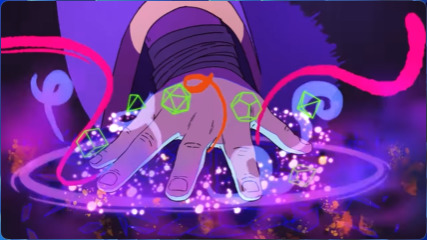
But this stops being a close up rather quickly, before it starts moving away. The shot just gives the hand context, and suddenly you aren't in an extreme close up of a hand, you are in a medium shot of a very large person. Then the camera pans backwards, and you can see villains and places spring up, although the perspective on Matt remains weird. Is he a few metres from you, or a hundred? How big is the Game Master here? There's a sense of mystery, of incomprehension. This is setting up some cosmic horror shenaniganry.

Then, we get Fearne. This is a wide camera motion, swivelling around her in a tracking shot that focuses on her face, and those eyes. It is like a reverse panorama, where Fearne is taking in the world, the world is observing Fearne.
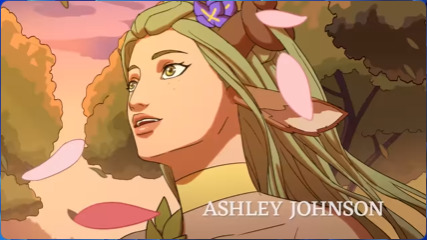
But I want you to take note of the leaves here, because they are used to form a connection between her and Orym. The transition uses them, while it isn't a direct wipe transition (the leaf just flies close to mask an abrupt cut), it is framed as one. The name of that isn't important, though, what's important is the leaves. By being in both shots, they emphasise the relationship between the two characters. But where for Fearn they show off her sense of wonder, for Orym, they take on a very different meaning.
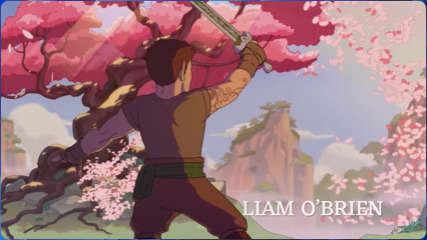
Notice, however, how still this shot is. There is no sense of danger here. This is a scene of a warrior with a sword and two people passing on from this world. But it's calm. Because this is a memory. Orym might not be at peace with the death, but the memory isn't a violent one, it's a memory of his family's lives.
Cut to a close up. Orym creates a gust of wind.
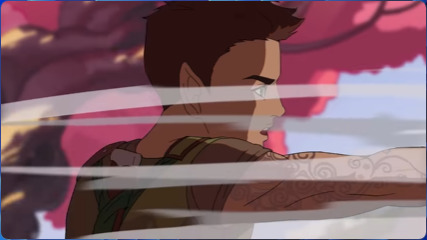
And cut to the next shot.
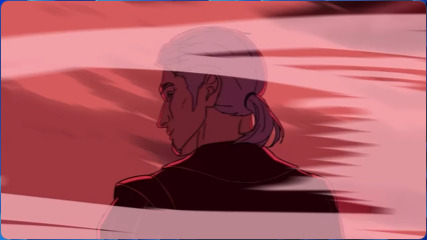
I will not lie, Bertrand is my favourite character across all of Critical Role, so this shot of him made me smile, but it isn't the point here. The point is Imogen's introduction.
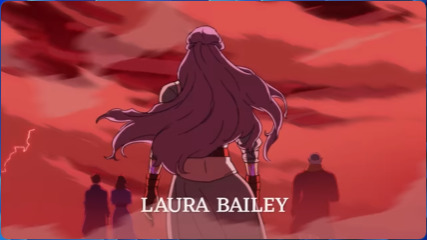
Although is Bertrand not actually the point? Because take a look at how Imogen is shown here. Do you notice anything?
She's shown in the exact same way. Imogen is shown doing the exact same thing that those who have died have done. And she can see them ahead of her. The camera panning back shows a wider perspective here, showing her as she tries to run, tries to get away from the same path as Bertrand.
The wind from Orym's blade that came to this scene gets across a consistent element: Memory. This is a dream. But dreams can become nightmares.
As Imogen loses her footing, the camera gives some of its wildest movements yet. It tumbles around her, then looks up.
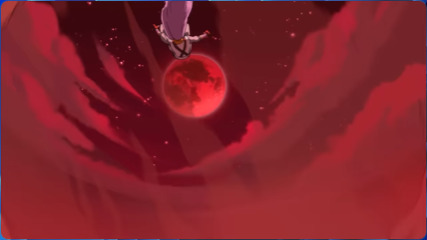
The camera stops moving when it sees the red moon, because now the viewer has something to orientate themselves around. There is a constant point, and we can see Imogen falling down. And getting closer, and closer, and closer, until.
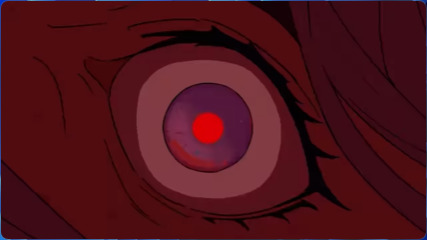
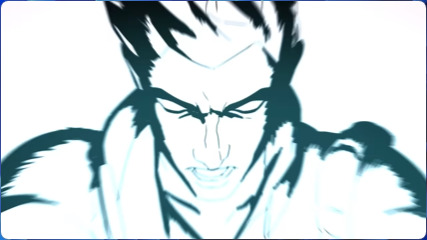

These are the three frames in order, there is nothing in between.
Imogen crashes into the screen, and we get an abrupt impact frame (that's the black and white one) then Ashton. This is so cool to watch, in my opinion, but it is quite possibly the opposite of smooth in camera work. So why is it so cool? Motion.
The motion is in towards Imogen and out away from Ashton. They are both falling, just in different directions. And the impact frame both helps smooth over and accentuate the abrupt transition.
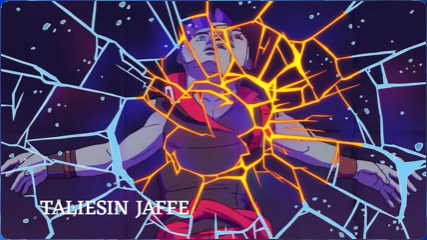
The camera around Ashton is a tracking shot. They are falling, but they remain the exact same in the screen (shrinking slightly). The rest of the world moves. And when Ashton lands, the screen cracks. The tracking shot is used to show Ashton's disassociation with their surroundings. Not in a "I feel nothing" type of way, but in a "it's me vs the world" type of way.
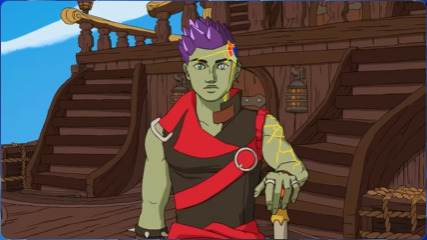
Then, there is an abrupt cut away. Nothing hides or smooths this at all, because Ashton's memory isn't smooth, and neither is Ashton. Remember the disassociating thing I mentioned, now it changes again to someone who gets lost in his thoughts. Medium.com calls this an "anxiety stare" and as someone who does that on the regular, I can attest to this abruptness being exactly what that feels like.

I'm not going to talk too much about the ship, but just be aware that there is a Dutch angle (the horison is diagonal) here to heighten the stress of it.
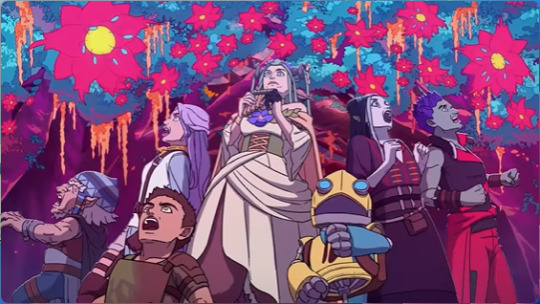
Likewise with this shot, there isn't much to talk about. The slow outward zoom and triangular composition are neat, and the tiered reactions (bottom row reacts, then middle, then Fearne) are amusing, but other than that, not much.
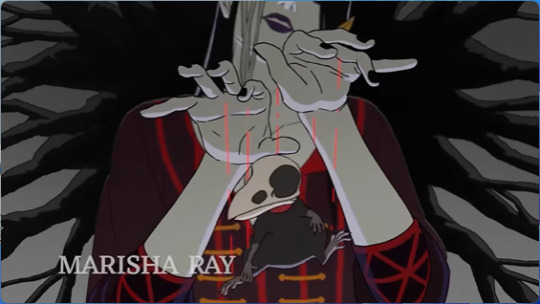
Then we meet Laudna, playing with Pate and giving him life. That's a neat little shot, I wonder if there's a metaphor there.
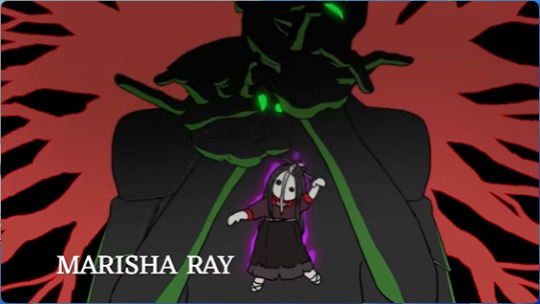
Oh.
This is a super cool visual because it establishes exactly who this character is in two seconds. But I also want to point out the symmetry of this. The hair becomes the blood which becomes the hair again, and then the tree.
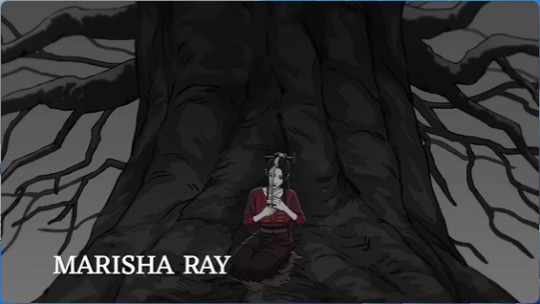
Laudna is introduced as big and scary and imposing, and that is very intentionally undercut by making her look small.
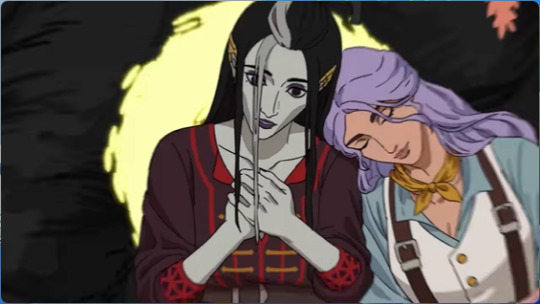
Being small means you are less likely to be the focal character, so shrinking Laudna takes away her agency. Only to give it back through Imogen, and when the camera pans back outwards, Laudna is the same size, but the colours and the surroundings make her feel less alone, and as a weird result of that, less small.
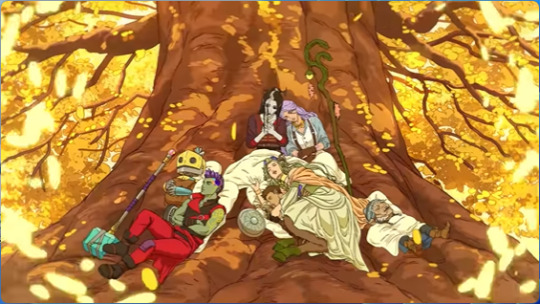
And last but not least in this moment, there is the delayed drop of the hands. Laudna finally feels safe and finally breathes a sigh of relief.
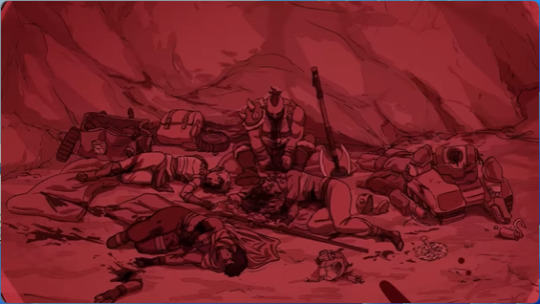
That, however, imediately match cuts to this. FCG's vision. The red tinting has obvious implications that I don't need to explain, but the match cut heavily implies a connection between this group and the Bells Hells. There is a fear that this might happen again made clear by a single transition.
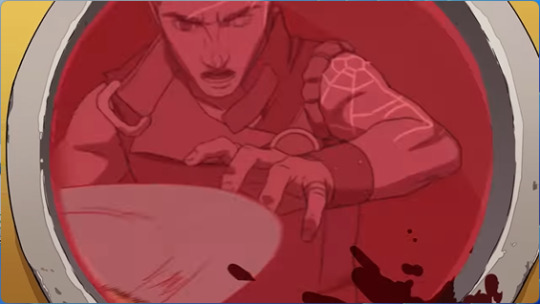
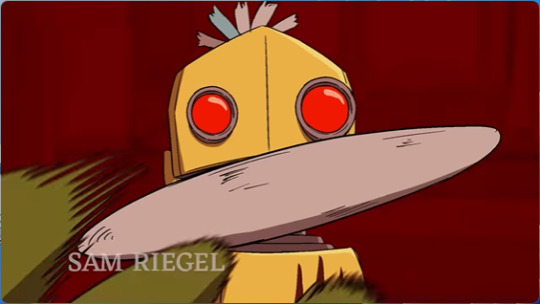
Here's something else. FCG doesn't move. At least, the camera doesn't treat them as moving. It's a slow panning out as if nothing is happening. It's the disassociation vibe that you get from Ashton's falling shots now repurposed to someone who isn't in control of their own actions. This is what FCG is afraid of, this is the important pieces of his character. This is FCG.
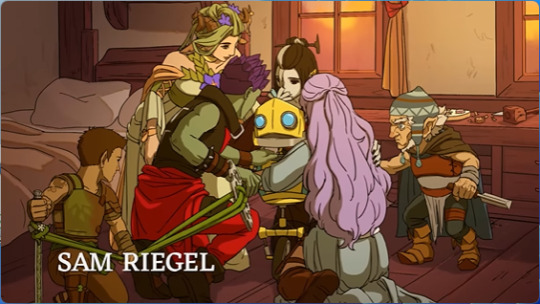
And just like Laudna, FCG finally gains agency when surrounded by their friends who hug them, and FCG finally moves.

Chetney Pock O'Pea, outlaw of the RTA, alpha of his own heart. A fundamentally chaotic character who takes rules as suggestions to be intentionally ignored. A man who's first instinct upon meeting you is to consider how you could be killed. And he is introduced whittling, with a steady camera and warm light illuminating his face. This is a peaceful side of Chetney, there is a duality to him.


Speaking of which, notice how Chetney draws back from the light as he transforms. His eyes begin to glow, but they don't illuminate him, until this:

Chetney is now backlit by the cold light of the moon itself (There's a neat reveal of Ruidus caused by the pan, but that's only tangentially relevant). Notice how much further you are from him here than in his first shot. But notice how much of him is visible, and how much of the screen he takes up. It's the same, this is still the same character. It's a true Doctor Jeckyl and Mr Hyde character. This isn't split personality, but a character who can be a different person in each form, while still remaining Chetney at all times.
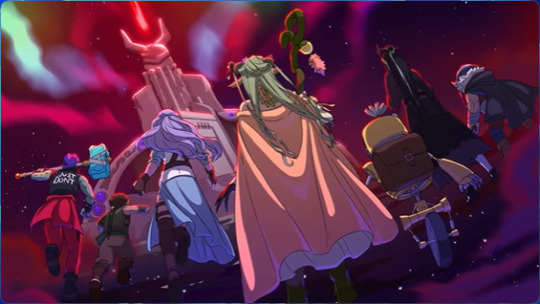
There is more in this video. I encourage you to watch it, but unfortunately, Tumblr has a limit on how many images I can include, so I will leave you with this final shot. A group of heroes looking up at a threat that is so much bigger than them, a threat that is literally controlling the light. But the Bells Hells are closer to the camera, they take up more of the screen. The battle isn't lost, instead, it is just starting.
#rants#literary analysis#literature analysis#media analysis#critrole#critical role#bells hells#imogen temult#laudna#ashton greymoore#fcg#orym of the air ashari#fearne calloway#chetney pock o'pea#its Thursday night#critical role bells hells#meta#meta analysis
523 notes
·
View notes
Text
potentially hot take but i find it so boring when people make Andrew out to be like. so effortless and someone who never messes up and plans every single thing that he does. like i understand that he has knives and can fight—he won't win a fight against every kind of person out there..it's not "underestimating him" to say that he wouldn't be able to threaten someone bigger or stronger enough than him. i understand that he's brilliant and has this eidetic memory—that doesn't mean that every inconsistent move he makes is intentional or secretly genius. he's not infallible. and he's so much more interesting if he's not smooth and perfect all the time.
#once again i think this goes back to the whole making him fit into some literary Bad Boy™ role#and nobody wants the Bad Boy™ to be less than steriley perfect#mine aftg
464 notes
·
View notes
Text
Y'all wanna know about a gender-non-conforming knight from 13th century France? No? That's okay- I'm fine with talking to myself.
I'm obsessed with gender performativity in early medieval texts- so obviously I had to know everything about Le Roman De Silence.
To preface-
So, long before there was the Marvel Cinematic Universe- there was the interconnected works of the Arthurian Legends. The original superheroes- King Arthur, Merlin, Morganna le Fey, and the rest of the cast. However, one of the lesser known (only arguably canonical) interconnected texts of the Arthurian legend hails from France. People argue over whether or not to include these texts as part of the cannon of King Arthur because it's technically french- and the french-english divide between characterization of all the main players of Arthur's court is remarkably different. Much research on this suggests the discrepancy of characterization is largely due to distance between where the stories originate, and sociopolitical tensions between the French and the English. Either people were too far apart to share stories- thus too far apart to keep characterization uniform, or they fucking hated each other enough to mess up the characterization on purpose. For example, many of the French portrayals of King Arthur paint him to be a rather terrible person, where English portrayals are generally more kind to him.
All that aside- many people will disagree that Le Roman de Silence should even be part of the Arthurian legend canon anyway- because it only mentions Merlin at the end of the poem and because it's a super french poem.
The main storyline is about this character named Silence. From the Old French Poem- Le Roman de Silence.
Gender? No- Never heard of it.
The latter half of the story in this poem is predicated on a complex mediation of Nature vs Nurture. What happens is that a baby is born into a wealthy family, and for sociopolitical reasons, the family decides to raise the girl baby as a boy. They name this child "silence." Silence grows up with full access to an education, as was typical for the boy children of aristocratic medieval families- this education becomes important later as Silence wrestle with where they fit into the larger social structure after maturing into adulthood. Essentially, they find the idea of marriage too boring and would like to be a Knight or Explorer instead. (I love them.) Anyway, it's fascinating to me that the conceptual ideas of nature and nurture are personified into being something like "deities" which are overseeing the growth of Silence through the ages- and so we get these deities commentary.
Silence wants to be a knight- so Nurture brags about being right that gender is more performative than it is biological. Then, later Silence grows up to be remarkably "pretty" and according to the deity of Nature- they brag about being right that biology and gender are intrinsically tied. It's such a thought-provoking mediation on gender as either performance or pure biology that I forget it was written in the 13th century- long before Freud or Lacan or any of the others who became hyper fixated on human presumption of gender as either a social category or a biological necessity.
I argued in a paper, once, that the narrative itself does actually finally end on the note that Gender is a performance, and it is tied into social roles only so the ruling class can have control of the population. That is why the stories ending shifts into horror-genre-esque of Silence marrying into the upper-ruling class.
I also have a strong urge to write a Fanfiction of Silence as a knight- who does not meet a sad fate but rather lives happily as a knight and eventually marries a princess. Okay- Okay? fine I said it. I said it-
Social pressure to marry?
The story takes a dark turn, however- when the King demands Silence to reveal themselves in front of the court. Obviously, even the author of the story was aware that misogynistic social standards would not allow for people to ever really be free of gender stereotypes and roles. So, Silence is then forced out of the adventurous lifestyle of a knight and into a marriage. Also, this is the place in the story where Merlin makes an appearance (I have a theory that Merlin is representative of the devil, and the author really hated that all AFAB people were forced into marriage back in 1200's. So that's why the devil shows up when all the bad shit is happening to Silence).
Inevitability and dismay-
What I find particularly interesting about this poem is the fact that the end, as Silence is forced into marriage and back into "proper" social roles for their assumed biological characteristics, is the fact that it is written like an early attempt at gothic horror!
So, one of the stipulations for something being a "gothic horror" is 1.) old, archaic, twisted buildings. (this blog is indeed named after my fixation with gothic horror elements, it's interplay relation to social reform, as its emphasis on decay as the tonal necessity for social indemnification). Anyway, the other most important aspect of gothic horror- is an overwhelming sense of desolation, isolation, and loneliness.
Sure, Silence is forced into marriage- but even with the forthright writing style of the author, we, as readers, are struck by Silence's loneliness. Thus, the "happily ever after" part of the storyline wherein the characters get married, as it traditional to chivalric romance, is recriminated against in subtext. Now, we have a moment in which the "happily ever after" is a creation of horror rather than peace.
Ending the narrative with marriage as equivalent to a loss of freedom and a sense of evermore-present loneliness, cumulating in the edifice of horror-struck fear in Silence at their own new future, is a remarkably bold social statement coming from a 13th century author.
I just think it's a really interesting text on the thematic points of negotiating Gender identity, in broader terms of performance and social roles, as much as it is a critique on the total social control that the monarchy held over the people of 13th century France.
Edit: I need to add that Silence themselves consistently rejects the idea that they are AFAB and instead only ever refers to themselves as "Silence" or "the knight"
#le roman de silence#medieval literature#13th century#manuscript#nature vs nurture#traditional gender roles#gender roles#france#french literature#french poetry#classic literature#academia#dark academia#gothic horror#marvel cinematic universe#king arthur#merlin#arthurian legend#arthurian mythology#arthurian literature#knight#medieval knight#gender#agender#nonbinary#chivalry#romantic literature#literary criticism#literary theory#poetry
76 notes
·
View notes
Text
When Jon comes back to life and gains a "ghost" moniker to match with Arya, so we get the "Ghost of Harrenhal" leading in Harrenhal and the "Ghost of the North" leading in the North
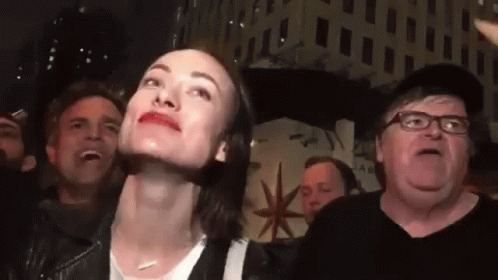
#jon snow#arya stark#asoiaf#his direwolf is literally named Ghost if he doesn't get a /ghost of the wall/north/ nickname or something it's a waste imo#especially if he comes back with white hair and/or red eyes...#the more I think about it /Lady of Harrenhal Arya/ eats and while I don't think it will be her endgame I would still love to see it#Arya and Jon both stepping into roles they never thought they'd have...Arya as a ruling Lady and Jon as Lord/King of Winterfell...#not to mention in places that hold pain for both of them#plus the added layer of Lyanna's connections to Harrenhal and Arya being her literary mirror + Jon's connection/parallels with Rhaegar#ALSO Arya saying that Jon's direwolf /was a ghost/ when she meets the ghost of high heart yeah...yeah
100 notes
·
View notes
Text
thinking about boromir dying and and his last words being “I have failed”
and Aragorn saying “No!” and kissing his brow and “You have conquered. Few have gained such a victory”
and realizing that even here, Tolkien was planting the seeds for Frodo, because Boromir’s victory, the victory Aragorn praised him for was that he fell to the Ring’s temptation but unlike gollum and Isildur he came back—
and because he came back, Frodo could too.
#literary emotions#lotr#boromir and frodo as foils#also as a side note#the whole interchange between Boromir and Aragorn reads remarkably like the catholic rite of confession#which i suspect was not an accident#but you have the naming of the sin: “i tried to take the ring from Frodo”#the act of contrition: “i am sorry”#and the act of penance: “i have paid” ie died trying to save merry and pippin#which means of course that Aragorn is taking the role of priest in giving absolution#which is very priest-prophet-king vibes#anyway tolkien is famously anti-allegory#but when people love to say “frodo is the Jesus-figure” in lotr i think they are massively overlooking aragorn#who like. is descended from a line of kings but of a now kingless country. and doesn’t look like a king. and heals people.#and something about the entrance into the city in disguise versus his entrance as the king reminds me of jerusalem#idk it’s not an allegory for similar reasons to why frodo is not an allegory#but i do feel that tolkien does allusions and symbolism a lot
52 notes
·
View notes
Text

Bottom of the lakebed
ID in alt
#i just think that. something something drowning as a metaphor for ptsd/depression.#and the roles that water play in the show as literary devices#like the rain in qiongqi way. and the lakes of lotus pier#he grew up near the water! his family tries to reach out to him while hes drowning! his family is rooted in him!#and hes drowning ohhh im so normal about this#my artwork#mdzs#mdzs fanart#the untamed#cql#wei wuxian
20 notes
·
View notes
Text
Thinking about how we have Yasha and Beau, tough-as-nails battle lesbians, who were punished by their families for being in love with the wrong people (other women,) who ran and left their partners to face the worst, intentionally or not, and who've spent their adulthoods stewing in that guilt. And Caleb and Essek, brilliant wizard prodigies who were manipulated and groomed, and who became so consumed by their own pride that they did terrible things in the name of their leaders, and who are running from those crimes.
But also! Beau and Essek, from wealthy, well-established families, who are trained in espionage, and finally decide they've had enough of the lovelessness of their parents and leave them in favor of their new family and loved ones. And Yasha and Caleb, growing up in poor, remote areas, who are trained as killers but wind up turning on their families and murdering them, and losing themselves in the process, and who are on quests to not only stop the ones who manipulated them into atrocities, but also find peace for themselves
#tasty tasty literary parallels#you love to see it#critical role spoilers#cr2#beau lionett#yasha nydoorin#caleb widogast#essek theyless
468 notes
·
View notes
Text
i feel like it must be said that i very much enjoy mithrun, he's one of my favorite characters, but the way the community at large handles him with safety gloves as if he'll break at the slightest criticism is very frustrating considering his role in the story is that of an antagonistic force
#like. i think its fascinating how ppl forget that he and the canaries are very much the antagonists of dm#no hes not the villain. no hes not the bbg the gang wants to defeat#but in terms of literary roles. he is 100% the antagonist#in that he directly opposes what the protagonists (laios + marcille)#are trying to do#yes he is incredibly sympathetic and enjoyable as a character#yes he has done things that are considered to be negative to the protagonists and kabru in particular#these are not mutually exclusive#part of the reason why i enjoy mithrun so much is bc of how layered he is#not even touching on how hes also a critique of how the disenfranchised still benefit and perpetuate their privilege#he is someone who is disabled and treated poorly by the system#but he is also a key factor in maintaining that very same system's status quo#and not unknowingly. he even says to marcille that he knows hes lucky in that one extra#dunmeshi#chattering#does this make sense. i have so many thoughts ping ponging off the walls of my brain rn
21 notes
·
View notes
Text

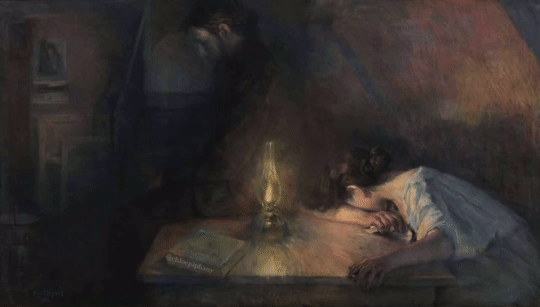

[A Doll's House by Henrik Ibsen / Despair by Leon de Smet]
gif made by me!
#henrik ibsen#a doll's house#book quotes#chaotic academic aesthetic#classic academia#classic academia aesthetic#classic literature#dark academia quotes#dark academia#dark academia aesthetic#english literature#literary quotes#literature#literature aesthetics#literature quotes#web weaving#books & libraries#bookblr#classic painting#gender roles#chloepiphany
112 notes
·
View notes
Text
Every day I am haunted by the fact JJK could be amazing but it will be just idk Bleach or something
#I've seen a lot of people complaining about the fact that it's impossible to fit the ending of every unfinished arc#in the five chapters that remain for the manga to end for good#And it all just... legitimises my fear and apprehension haha#And it's a pity! It's a pity! The dynamics were so good! And yet nothing! Sukuna was so good! And yet nothing!#It was so nice how he seemed to play with the idea of transcending human categories and values but even the values of curses so to speak#Well beyond everything. Well beyond positive/creative nihilism even! He was not like Mahito#I wonder if Mahito is more a negative nihilism with a funny edge or a positive nihilism. For now it seems positive#with how he seems to have said something like 'nothing matters so we can do whatever we want and create what matters'#But Sukuna transcends all that! It could have been interesting to see how that developed in a way that wasn't just childish edginess#But no. And then there's all the idea of curses and sorcerers not being all that different#and so not really entirely possible to say one side is good and the other bad#There was the idea of the very source of powers with fear and love playing a role here in such a juicy way#And then there's the entire thing happening with Gojo as a concept and the very concepts he plays with which I could eat like an apple#but also I would let those very concepts eat at my heart as a worm inside an apple#Full of holes and rotting inside out and yet delighting at the sweetness#It could all be so good! And yet! Most of the manga is a few sketched dynamics and concepts and a very long fight with Sukuna#promising half finished arcs#WHY it could have been so good. And I don't think criticism is a matter of 'fans being spoiled! Go write your story!' or something#It's not a matter of things not going as fans would want them to be. It's a matter of not writing well#or cohesively things established by the author themselves. And I think that's a fair criticism#If we are to take manga as an art‚ which I wholeheartedly support‚#then we can subject mangas to artistic or literary or whatever you want to call it analysis. There are works that are better constructed#than others‚ and there are works that have good ideas but poor execution. And it's always a pity#In the case of JJK it's truly breaking my heart and the comments I see around about these five last chapters are not helping xD#God it could be so good. So good. And I'm not talking about in specific to me‚ which yes that too given the topics‚#but just so good in general. It could be so good. It could have been so good#And yet it's starting to look more and more like any other shonen. It truly breaks my heart haha#I talk too much#Jujutsu Kaisen#I used Bleach because I think that's one of the mangas that has been the most a let down to the friends I have who like shonen
12 notes
·
View notes
Note
Hi! I hope this is okay but I would love to hear more of ur thoughts about the Yunmeng siblings because they are important to me and your tummy hurt comic hasn't left my brain as just,,, such good immediate characterization! ^^ Thanks!

I have too many thoughts on the Yunmeng siblings to fit into a succinct post, but I can offer you a Jiang Yanli addendum to the tummy hurt alignment.
#ask#poorly drawn mdzs#mdzs#jiang yanli#They way I analyze characters is in two layers - the first is how these characters act as literary devices#(i.e. their relationship to the protagonist and themes of the story)#And the second is who they are as independent characters.#Which means I have extensive thoughts on JC and JYL on a scene to scene basis as well as overall thoughts.#The tummy hurt comic was always about the different ways we process grief#and Jiang Yanli's role as the 'comforting older sister figure' despite the hurt she carries in her heart truly fascinates me.#I can relate in the sense I find it easier to care for others than care for my own grief.#But that grief caught me eventually. And it was ugly and raw.#JYL is grief in rose tinted glasses (minimized). JC is the messy chaos of grief when raw and exposed. Clever move to make them siblings!
456 notes
·
View notes
Text
What exactly does Pan teach you?
So, Pan's inclusion in Stray Gods is weird, right? Not in a sense of he doesn't belong or fit in the story, because he certainly does. But why Pan?
When you think of the Greek gods, chances are you think of Zeus, Poseidon, and Hades. In Stray Gods, these big names are absent, and here is Pan, someone a large portion of players had never heard about before now, offering you some advice.
SPOILERS AHEAD
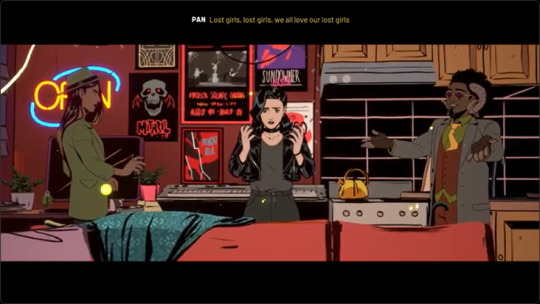
First up, mythologically, Pan was the god of the wilds, usually. I say usually because there was no cannon for Greek Mythology because of how ancient Greece works. It wasn't so much one unified nation, but a collection of city-states with shared cultural elements. As such, different states had very different views of the deities, and these shifted over time. For example, Artemis is usually defined by a lack of romantic interest, but Sparta worshiped an epithet called Artemis Orthia, who was a goddess of fertility and childbirth. You can see why this gets complicated.
With that said, Pan is usually a god of nature and freedom, sometimes associated with medicine, sometimes associated with madness and fear, and sometimes associated with music. This is a figure who is hard to pin down.
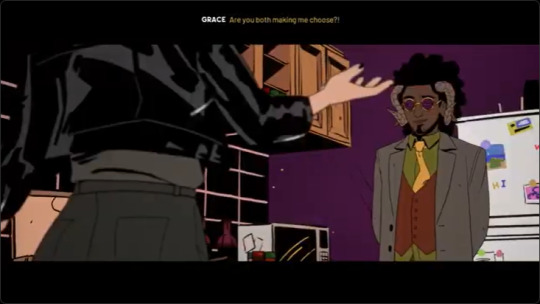
This doesn't really answer the question: Why is Pan?
I think the answer is his distance from the rest of the idols. Olympus is defined by tradition and the past. It is burdened by trauma, and Pan, the god of freedom, represents the exact opposite. This is a character who is desperately looking forward. He seeks grace out because of guilt over Caliope's death, and instead of confronting that, he runs as fast as he can into the future. He isn't as free as first impressions would tell you.
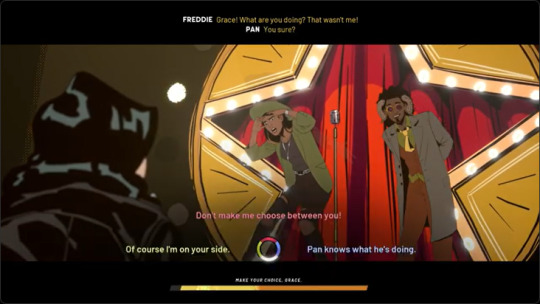
Ok, enough preamble, what is this song about?
First up, this song takes the "why are they all singing" comment about musicals and looks you directly in the face to say "its magic, deal with it."
But second, and more importantly, this song offers you another choice. Stray Gods is about choosing your own fate, and the teaching song gives you an obvious one. Freddie, Pan, or neither.
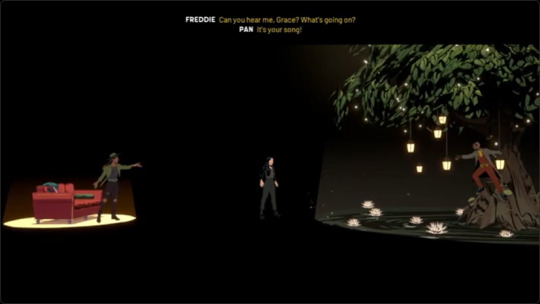
Stray Gods isn't short of incredible visuals, but this is by far my favourite. And it isn't what you think. In any other story, this would be the choice between going on the adventure or staying home, but you're going, otherwise, Grace will be killed. This is asking you how you will go about that.
Freddie, identified with small comfort, is contrasted against Pan with the very whimsical imagery of the tree. Freddie represents safety, Pan represents urgency. Freddie represents using what you know, Pan represents diving headfirst.

Speaking of that metaphor, welcome to the waters. It's deep, you can't see the surface from here, and the murk stops you from seeing much other than Freddie and Pan. Who do you choose? Who do you trust?
What does Pan actually teach you? Not much, he explains how Grace's powers work and that's pretty much it. Except for one thing, Pan, quite accidentally, teaches you how this story will work.
Welcome to the world, it's going to be murky, you're not always going to be able to tell what is in front of you, but you can always make a choice, and you have to deal with the consequences.
Previous - Next
#rants#character analysis#literary analysis#greek mythology#stray gods#literature analysis#what's so special about...?#stray gods pan#khary payton#khary payton kills in this role#meta#meta analysis
191 notes
·
View notes
Text
I would like to sincerely say to all the people on Goodreads or anywhere else who complain about how the narrative in A World Without Princes treats “feminism” and “feminists” as bad and evil, don’t really understand the point of the book.
Because ever single book in the School for Good and Evil series tries to teach a lesson about not falling into one extreme or the other. Because either can hurt you, if you fall to far into them.
For example, in SEG it was Good and Evil. TLEA — Young and Old. QFG, COT, OTK — Truth and Lie.
So, keeping that in mind, what exactly is this kind of lesson that is trying to be taught in AWWP?
Toxic Masculinity and Toxic Feminism.
In fact, I would go as far as to say that Aric Lesso and Evelyn Sader, respectively, are the two characters that embodied these ideas the most.
After all, they’re antagonists, antagonists that oppose both our heroes — directly, in the story — and each other — fundamentally, in ideology.
#idk if this is anything#idk what im doing#analysis#character analysis#literary analysis#media analysis#media literacy#in response to media criticism#sge#the school for good and evil#the school for good and evil: a world without princes#the school for good and evil: the last ever after#the school for good and evil: quests for glory#the school for good and evil: the crystal of time#the school for good and evil: the one true king#feminism#toxic feminism#toxic femininity#masculinity#toxic masculinity#gender roles#evelyn sader#aric lesso
22 notes
·
View notes
Text



Odazai Tangeled au I did way back last year. It was honestly a fun idea.
#my art#do not repost#bsd#literary stray dogs#dazai osamu#oda sakunosuke#bungo stray dogs#odazai#digital art#oda x dazai#chuuya and ango are perfect for their roles you cant convince me otherwise
147 notes
·
View notes